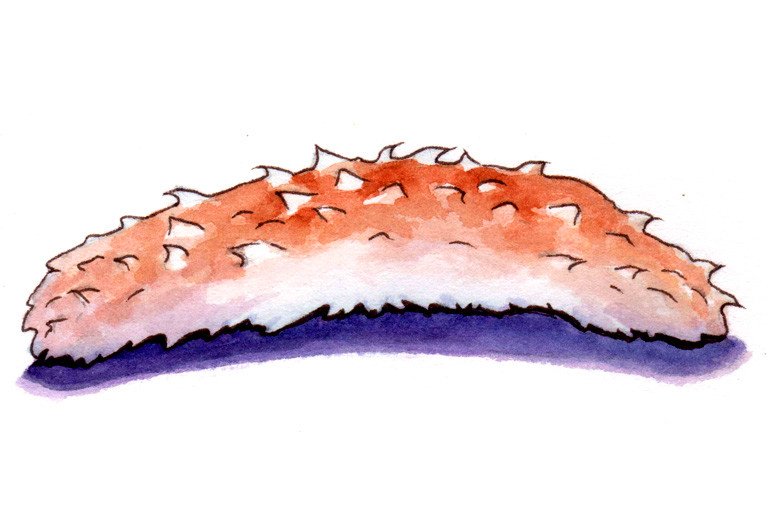
Common Names
- Holothurian
- Haishen
For Patients & Caregivers
Tell your healthcare providers about any dietary supplements you’re taking, such as herbs, vitamins, minerals, and natural or home remedies. This will help them manage your care and keep you safe.
Although sea cucumber has been used in traditional medicine for several conditions, studies in humans are lacking.
Sea cucumber is a marine invertebrate related to sea urchins and star fish. It is dried and used in soups and other dishes and is considered a delicacy in Asian countries. Sea cucumber is used in traditional Chinese medicine to treat fatigue, impotence, constipation, frequent urination, and joint pain. It is also a rich source of chondroitin sulfate, commonly used for arthritis.
- Cancer treatment
Lab experiments suggest a saponin compound in sea cucumber may have antitumor properties, but it has not been studied in humans. - Longevity
Sea cucumber is used in Chinese medicine to increase longevity, but there are no clinical data to support this use. - Impotence
Although sea cucumber is used in Chinese medicine to treat impotence, there are no clinical data to back this use. - Joint pain
Sea cucumber is a rich source of chondroitin sulfate, which may be helpful for osteoarthritis. - Frequent urination
Sea cucumber is used in Chinese medicine to treat urinary problems, but clinical data are lacking.
Acute occupational exposure: 3 cases from workers processing sea cucumbers by hand caused skin, breathing, and eye irritation. These symptoms likely resulted from a compound that sea cucumbers use as a defense becoming airborne, and then inhaled or otherwise ingested by workers.
Do Not Take if:
- You are allergic to seafood.
- You are taking anticoagulants: The polysaccharides present in sea cucumber may increase the effects of anticoagulants, increasing the risk of bleeding.
For Healthcare Professionals
Sea cucumber is a marine invertebrate found all over the world and is a delicacy in Asian countries. It is used in traditional Chinese medicine to treat fatigue, impotence, constipation, frequent urination, and joint pain. It is a rich source of mucopolysaccharides, especially chondroitin sulfate, commonly used for arthritis.
In vitro studies suggest saponins and fatty acids present in sea cucumber may have antiangiogenic, antitumor (2), antiproliferative (1), and antiviral properties (3) (4). Studies in humans are quite limited, however. Preliminary findings suggest a sea cucumber extract may help chronic gingivitis (5), but clinical evidence for its use in any condition is lacking.
Sea cucumbers are considered a delicacy in Asian countries. They are cooked, dried and used in soups and other dishes.
- Antiaging
- Arthritis
- Cancer
- Frequent urination
- Impotence
A branched-chain fatty acid known as 12-methyltetradecanoic acid, isolated from sea cucumber, is thought to inhibit prostate cancer cell proliferation by increasing caspase-3 activity (1). The proposed mechanism for the antiangiogenic and antitumor effects of Philinopside A, a saponin derived from sea cucumber, is by inhibiting tyrosine kinase receptors (2). Frondoside A, a triterpenoid glycoside from Cucumaria frondosa, may also have antiangiogenic activity (9).
Sea cucumber may not be appropriate for individuals who are allergic to seafood.
Case reports
Acute occupational exposure: 3 cases from manually processing sea cucumbers during a machine breakdown, resulting in cutaneous, respiratory, and ocular irritation (10). Symptoms likely resulted from aerosolized holothurins, which are saponins that sea cucumbers secrete as a defense.
Anticoagulants: The polysaccharides sulfated fucan and fucosylated chondroitin sulfate may potentiate the actions of anticoagulants (8).